- See USC’s Final 2020 Plan Progress Report Card
- Read USC’s Full 2015-2020 Final Sustainability Summary Report
APRIL 2021 UPDATE
Energy
Data from our FY20 GHG Emissions Inventory revealed that, in 2020, USC achieved a 35% reduction in normalized (per square foot) GHG emissions from 2014 levels, meaning we far surpassed the GHG reduction goal set forth in the 2020 Plan (20% reduction by 2020).
See the FY20 Greenhouse Gas Emissions Inventory Summary for more information.


237 USC classrooms now integrate class scheduling into their HVAC schedules to improve efficiency of energy usage. 40% of USC Housing buildings and nearly 100% of parking structures have also been upgraded with LED lighting.
Waste
A multi-stream waste bin pilot program launched at USC Village and HSC Pappas Quad, allowing Trojans to properly dispose of all waste in high-traffic areas. According to findings, providing the proper tools and instructions leads to increased recycling and correct composting.

All USC Housing residential colleges have introduced composting programs, with lobby bins and compost pails available for in-room use. 95% of single-use, personal consumption items have now been eliminated from USC Residential Dining
Water
USC has achieved a 10% reduction in potable water usage from a 2014 baseline, an achievement that has come from a variety of water-saving initiatives.
- 17 water sub-meters have been installed in UPC buildings, providing real-time, detailed water usage data.
- 90% of UPC irrigation is centrally controlled and employs weather-based sensors.
- 1,242 low-flow, touchless faucets have been installed in 77 non-housing buildings as part of a university-wide replacement initiative. The new fixtures are rated at 0.35 gallons per minute and can cut water use by as much as 85%.

Transportation
There are now 138 EV charging ports located in parking structures and parking lots across both UPC and HSC.
USC Transportation’s Commuter Cost Calculator allows faculty and staff to calculate the cost savings and emissions reductions of enrolling in USC’s Transit Subsidy Program. For more than 10 years, USC has exceeded its SCAQMD target of an average of 1.5 riders per vehicle coming to campus and in 2019 achieved an average of 2.0 riders per vehicle.
Procurement
USC Hospitality’s commitment to sourcing sustainable food has led USC to far exceed its goal of purchasing 20% of food from sustainable sources; we now purchase 41.4% of food from sustainable sources.

USC Purchasing’s “Buying Green” website aggregates sustainable purchasing information and educates schools and departments on how to do so using USC’s network of preferred suppliers.
USC Hotel has earned Green Seal Silver Certification for leadership in key sustainable categories including environmentally sensitive purchasing.
Engagement
1,000+ students, staff and faculty shared insights through the Sustainability 2028 Plan survey.
The Office of Sustainability has begun USC’s first Sustainability Tracking, Assessment and Rating System (STARS) report to measure and manage sustainability progress and to educate departments across the university on their role in building a greener USC
Participation in USC summer and winter orientation and new employee onboarding events allows the Office of Sustainability to educate all incoming undergraduate students, transfer students and nonacademic staff on the university’s sustainability initiatives.
FEBRUARY 2020 UPDATE
Energy
USC continues to make changes to reduce energy use and increase efficiency, with an ambitious goal to reduce our greenhouse gas (GHG) emissions per square foot by 20% from 2014 levels by 2020. Data from our FY19 GHG Emissions Inventory revealed that, in 2019, we surpassed our GHG reduction goal a year ahead of schedule, achieving a 33% reduction in normalized (per square foot) GHG emissions from 2014 levels.
- See the Greenhouse Gas Emissions Inventory Summary for more information.
Heating, Ventilation, and Air Conditioning (HVAC) scheduling has been implemented in 18 buildings, 237 classrooms, and 40 air-handling units, and USC is registering energy savings at or above projected levels. In one month alone, this project saved more than 42,000 kWh. The program is projected to extend to an additional 259 classrooms.
FMS installed large power connections at Lewis Hall and Doheny Library that allow for use of campus electricity during large events, significantly reducing campus emissions from diesel generators.
Solar panels have been installed on the Galen Center roof and will begin to provide up to 15% of the arena’s energy use starting in mid-2020. The installation marks USC’s largest solar project to date, adding to our solar portfolio which already includes the Cardinal & Gold apartment building and the Wrigley Marine Science Center on Catalina Island.

Transportation
For electric vehicle drivers, a total of 130 electric vehicle charging stations are available in over half of the parking structures on the University Park Campus and both structures on the Health Sciences Campus.
Effective October 1, 2019, USC began subsidizing 50% of the public transit costs of faculty and staff who enroll in the USC Transit Subsidy Program. The program is administered by USC Transportation, which coordinates regularly with transit partners and provides all operational support.
The transit subsidy is intended to reduce the number of single-passenger cars on the road during peak commuting hours, and is available to all USC employees in the United States, regardless of whether they work at one of the two main campuses or a satellite office.
Since its inception in October 2019, USC’s Transit Subsidy Program has resulted in a reduction of 174 cars commuting to and from our campuses.
For more information, visit the Transit Subsidy Webpage and see answers to Frequently Asked Questions. To enroll in the program, fill out the Transit Subsidy Signup Form.
Waste
Residential Restaurants have eliminated 95% of single-use, personal consumption items—such as individually wrapped packets of sugar, butter, and condiments—to reduce waste. Residential Restaurants also compost pre- and post-consumer food waste; an audit in October 2019 revealed that 1,100 pounds of post-consumer waste was being composted daily.
During the 2019 football season, fans diverted over 240 tons of waste during Rams and Trojans games through recycling and composting. Since the inception of the Coliseum Zero Waste program in 2016, over 1,000 tons of waste have been diverted from landfill.
President Carol Folt set the precedent for zero waste events at USC through her inauguration ceremonies in September 2019, which diverted an estimated 4,535 pounds of waste from local landfills and helped to educate the USC community on the importance of recycling and composting. In 2019, the Office of Sustainability and Facilities Management Services worked with event hosts to divert waste through composting, recycling, and donating leftover food. See below for metrics on how much waste campus zero waste events diverted from landfill:
- President’s Inaugural Events — 4,535 pounds diverted
- Campus Game-Day Tailgates — 8,394 pounds diverted
- Trojan Family Weekend — 3,600 pounds diverted
- President’s Staff Holiday Breakfast — 1,950 pounds diverted
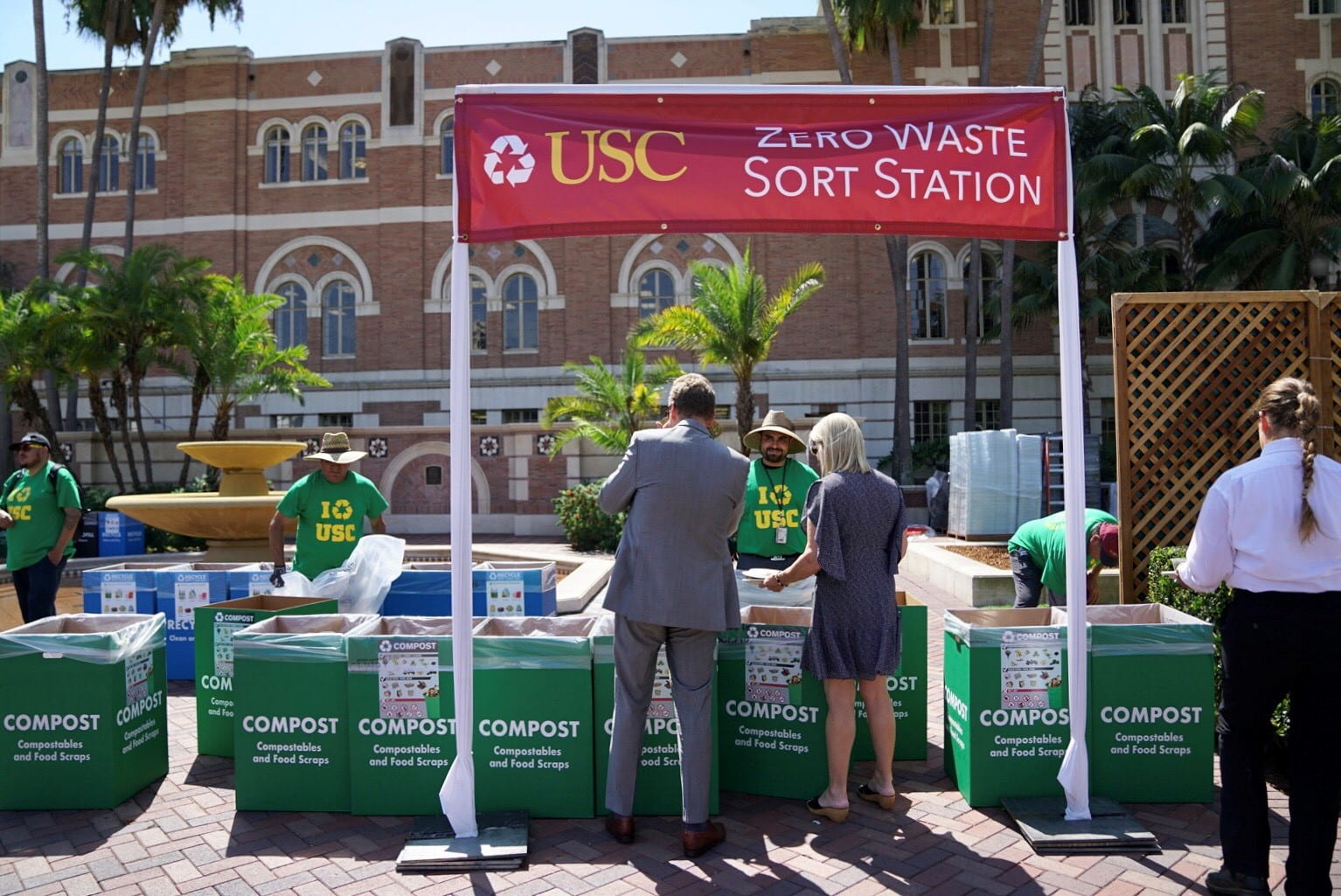
Water
USC Housing has now replaced approximately 6,800 water fixtures with newer, more efficient fixtures and the university has implemented standard practices for all new construction projects on both the University Park and Health Sciences campuses to improve water conservation efforts.
Procurement
By 2019, nearly 39% of food purchases for USC Hospitality came from sustainable sources—allowing us to dramatically exceed our Sustainability 2020 Plan goal of 20% ahead of schedule. 65% of meat and 50% of produce in our Residential Restaurants now come from sustainable sources. See below for detailed data on sustainable food purchasing:
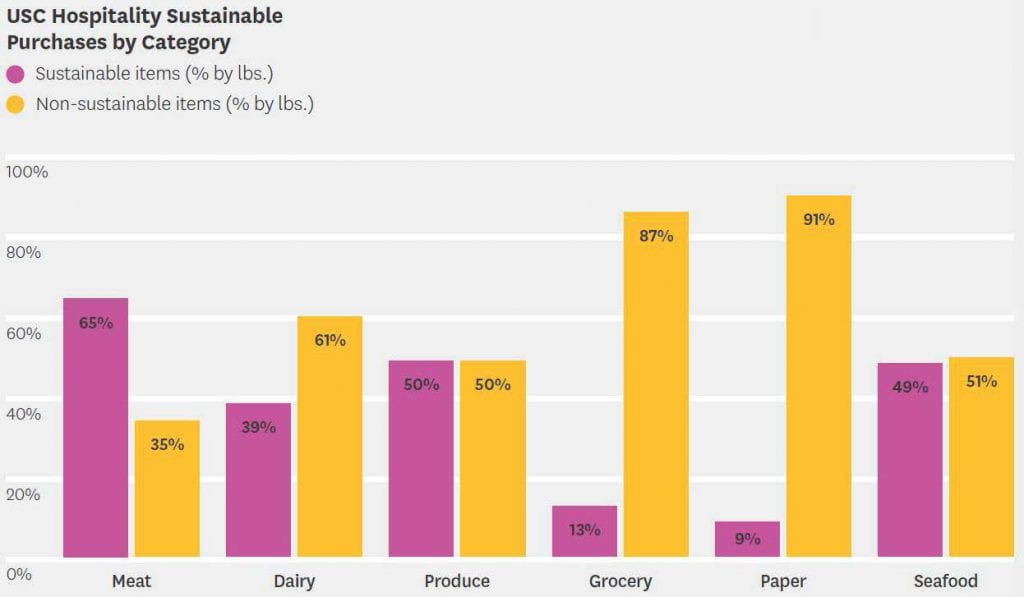
Engagement
The Office of Sustainability continued regular campus engagement efforts through class presentations, New Student Orientations, and various tabling events, and began sharing sustainability information with new USC employees through biweekly New Employee Orientations.
The “Our Future is Sustainable” multi-platform media campaign expanded to run on two USC buses and in four campus bus shelters.

AUGUST 2019 UPDATE
Engagement
The Office of Sustainability launched the “Our Future is Sustainable” multi-platform media campaign in the Daily Trojan orientation issue in August 2019. It highlights steps USC is taking to advance sustainability, and how all Trojans can make small behavior changes that have a big environmental impact. Executions will run throughout the year in the Daily Trojan, and on digital screens and other media platforms across campus as follows:
- 20 Housing and two Residential Restaurant locations
- USC Bookstore
- 12 ITS screens: KOH and WPH Computing Centers (two screens each), Leavey library (four screens), and Taper Hall (four screens)
- 11 FMS screens: Norman Topping Tower, and the FPM, ZMT, VBB, CDF, and ADM buildings
- Four Student Affairs screens: Sample Hall concierge desk, entrance column, 1st floor elevator landing, and 4th floor elevator landing; and TCC Plaza (near Seeds exit)
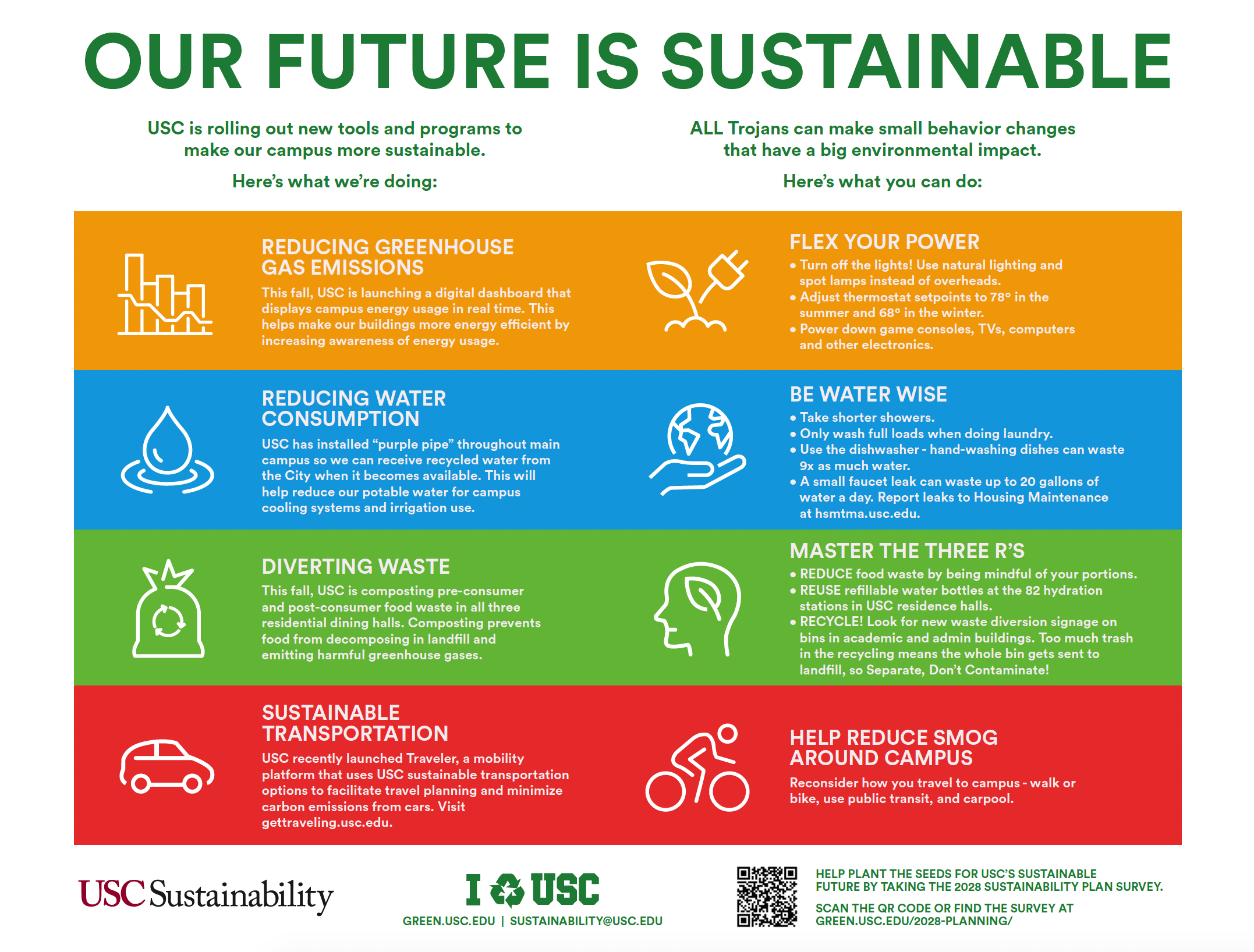
In partnership with USG, USC Auxiliary Services, and the USC Bookstore, the Office of Sustainability developed a sustainability pledge that encourages Trojans to make small behavior changes that add up to a large environmental impact. By taking the pledge, students commit to making changes in how they shop, commute, use water and electricity, and more. The pledge will be marketed through the below door hanger that is distributed in USC Housing and at various campus engagement opportunities.
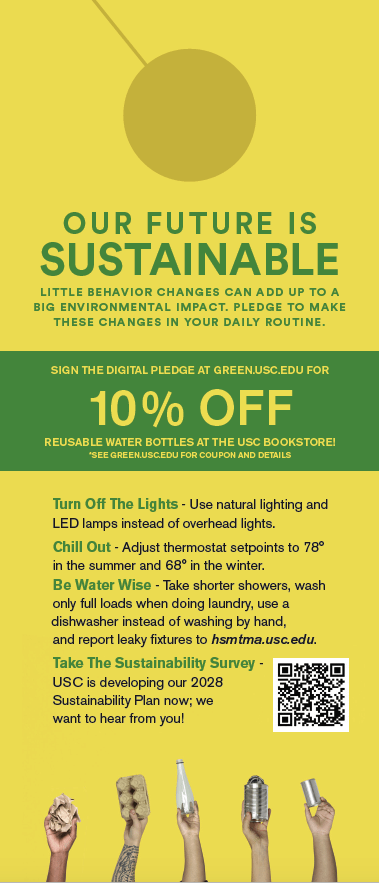
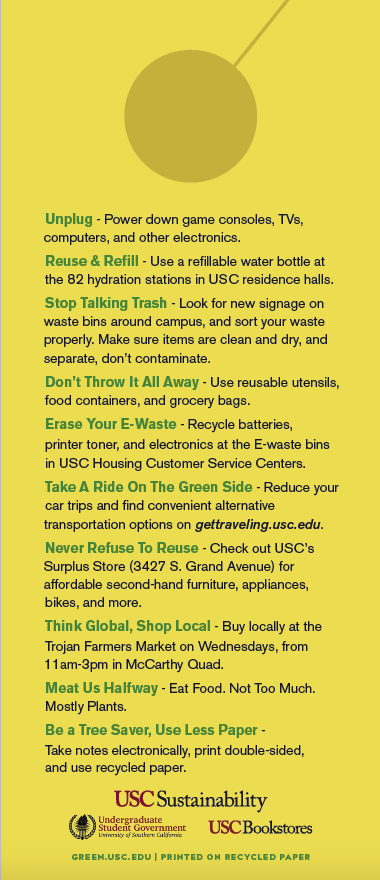
Waste Diversion
USC’s waste diversion practices have changed significantly since 2018 due to the new Los Angeles waste franchise agreement. Under RecycLA, USC now must separate waste on campus, rather than have our trash haulers separate it at an off-site materials recovery facility (MRF). Also, compostable materials (other than food waste) were not accepted at the local composting facility until recently.
These changes have resulted in a dramatic decrease in USC’s waste diversion rate from 54.21% in 2015, to 27% currently. Based on this, FMS projects that USC will achieve a 40% waste diversion rate by the end of 2020, as opposed to the Sustainability 2020 Plan goal of 75% waste diversion rate.
For the period of August 2018 to May 2019, USC’s overall waste diversion rate was 27%. This does not include waste diverted through the USC Surplus Store, construction and demolition, or paper shredding. Waste diversion by location was as follows:
- UPC – 36%
- University Village – 45%
- USC Housing (off -campus) – 22%
- CAL building (off campus) – 47%
- HSC – 19%
FMS has placed 136 new multi-stream Max-R waste bins across the University Park Campus and 49 bins across the Health Sciences Campus. Signage developed by the Office of Sustainability delineates what items should be placed in landfill and recycling bins and will help Trojans sort their waste correctly.

Energy Conservation
This summer, USC’s energy team launched a digital dashboard that displays campus energy usage in real time. Increasing awareness of our energy use helps to make our buildings more energy efficient.

Also this summer, USC also began participating in LADWP’s Demand Response (DR) Program, which coordinates grid energy load reduction on high temperature days. 45 campus buildings are participating in the effort this year, and our cumulative target drop is 600kW. LADWP confirmed that USC achieved a drop of 833 kW (approximately a 4.2% drop on the UPC load) during our first DR event on July 25 1p – 5p.
In spring 2019, USC Housing coordinated an energy competition among seven residential colleges, engaging approximately 1,000 students during the two-week competition and resulting in an overall energy reduction of 3.42%, saving 13,385 kWh.
Water Conservation
Construction is in progress on the water metering project that will bring sub-meters to UPC. 17 sub-meters have been installed as of December 2019.
APRIL 2019 UPDATE
Water Conservation
The water metering project that will bring sub-meters to UPC campus will be implemented on the following revised schedule:
Phase 1: Summer 2019 = Approximately 17 sub-meters
Phase 2: TBD 2019 = Approximately 20+ sub-meters
Education & Research
On April 22, USC launched its newest sustainability research center. The Center for Sustainability Solutions is a university-wide center that leverages and enhances USC’s existing sustainability-related teaching, research, and outreach. Its unique mission is to advance the application of basic science and technological solutions to specific urban contexts, with an eye on developing practical solutions and sound public policy for a sustainable and equitable future. The Center’s first research ‘rapid-assessment’ study can be found here.
JANUARY 2019 UPDATE
Education & Research
This year, the USC Institute on Inequalities in Global Health has been working with the office of Los Angeles Mayor Eric Garcetti and other partners on the application of the UN global sustainability goals to homelessness and other “wicked” problems in the city of Los Angeles. The work of the Institute can be found at https://globalhealth.usc.edu.
Engagement
Last fall, the Office of Sustainability worked with groups across campus to educate Trojans about waste diversion, as part of our TROJANS RECYCLE RIGHT initiative. Multi-channel efforts included:
- The waste diversion campaigns “Separate, Don’t Contaminate” and “Stop Trash Before It Starts” were featured on over 50 digital screens in November and December, including:
- 20 Housing and two Residential Restaurant locations
- USC Bookstore
- 12 ITS screens: KOH and WPH Computing Centers (two screens each), Leavey library (four screens), and Taper Hall (four screens)
- 11 FMS screens: Norman Topping Tower, and the FPM, ZMT, VBB, CDF, and ADM buildings
- Four Student Affairs screens: Sample Hall concierge desk, entrance column, 1st floor elevator landing, and 4th floor elevator landing; and TCC Plaza (near Seeds exit)
- Between September and November, the Sustainability Office also ran a series of five Daily Trojan ads that featured recycling instructions and other waste diversion information:
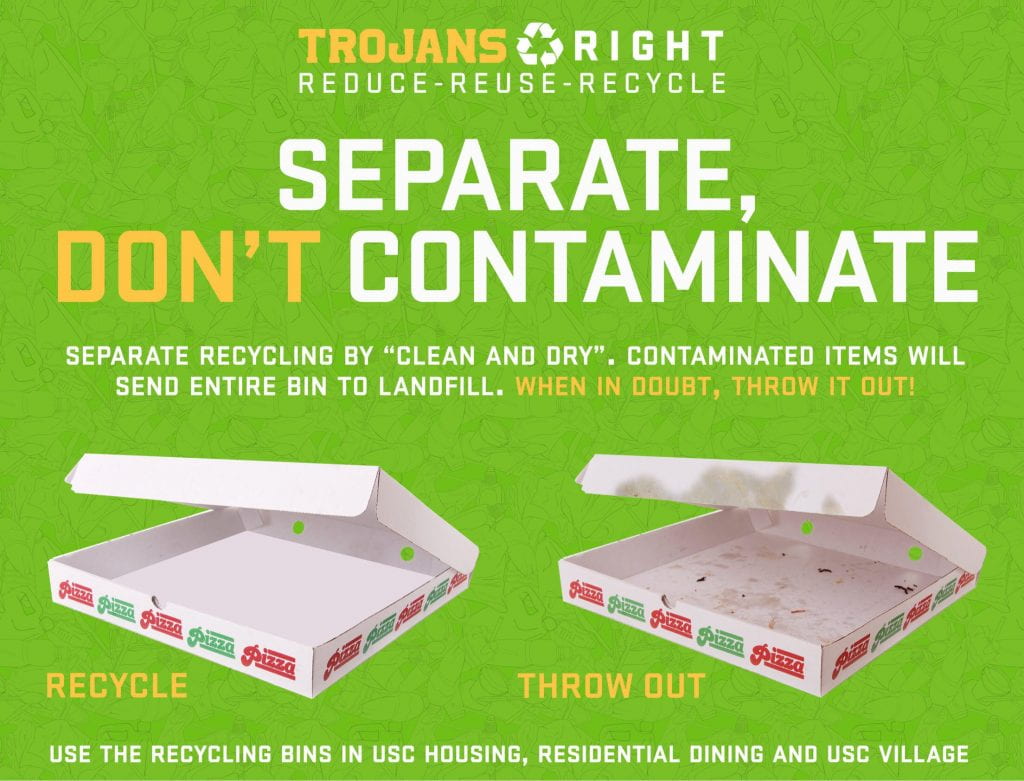

- The Office of Sustainability team launched the Trojan Trash Talkers (TTT) campus tailgate recycling engagement program, and continued its successful partnership with the LA Coliseum to garner media coverage for the Trojan football “Green Game” in October. The Sustainability team also continued supporting the Coliseum Zero Waste program overall by submitting for multiple national collegiate sustainability competitions.
Energy Conservation
FMS has announced updates for the following 2020 Plan energy projects:
- HVAC Automated Scheduling Software – Project is in-progress with 15 buildings and 242 classrooms already completed. The platform will be extended to an additional 259 classrooms. In one month alone, this project saved over 42,000 kWh.
- LED Lighting Installation – The most recent project began in December 2018 at Popovich Hall (JKP), and projects are currently being reviewed at Lewis Hall (RGL). LED efforts will be done in coordination with RCx studies whenever possible, and will cover buildings throughout the campus.
- Existing Building Retro-Commissioning (RCx) – The first two RCx and Energy Audit projects are being kicked off in January 2019 at Irani Hall (RRI) and the School of Cinematic Arts (SCA). This multi-building initiative is projected to include up to 150 buildings.
Transportation
USC Transportation launched its new Mobility Hub last September. USC Transportation also reported reduced SOV numbers compared to 2014, completing USC’s Sustainability 2020 goals for the Sustainable Transportation category.
| Drive alone | Carpool | Rail | Walk | Bike | Bus | EV | |
| 2014 | 56 % | 6% | 7% | 3% | – | 6% | 0.12% |
| 2018 | 49 % | 10% | 9% | 12% | 5% | 7% | 1% |
Waste Diversion
As of this fall, 106 trash bins, 84 recycling bins, and 15 composting bins are located at UPC and USC Village to dispose of waste. In addition, the campus utilizes industrial equipment such as roll-offs and compactors to dispose of wood, cardboard, green waste, and solid waste. Between August 2018 and November 2018, USC disposed of approximately 2,402 tons of solid waste, 624 tons of recycling, and 109 tons of compost on campus. Our waste diversion rate, broken out by location, is as follows:
- UPC (campus) – 46%
- USC Village – 80%
- USC Housing (off -campus) – 33%
- CAL building – 86%
- HSC – 10%
Also between August 2018 and November 2018, USC Dining facilities and Trader Joe’s participated in a food recovery program that enabled USC to divert 53.73 tons of food from landfill.
LA Memorial Coliseum Zero Waste Program
This fall, the Office of Sustainability continued to support the award-winning Coliseum Zero Waste program throughout the Trojans and Rams football seasons by overseeing vendor composting compliance, and assisting with facility waste diversion and reduction efforts.
- Overall during the 2018 football season, 251.07 tons of Coliseum waste was hauled to date, with 227.89 tons diverted from landfill, for a seasonal diversion rate of 90.76%, and 12 of 15 games reaching Zero Waste status.
- The season included an average 90.19% waste diversion rate for the USC Trojans, over 81 tons of waste being diverted from landfill and 4 of 6 games achieving Zero Waste status.
- To date, a Rams average seasonal diversion rate of 91.58% has been achieved, with 8 of 9 games this season achieving Zero Waste status.
- New this season, we achieved the goal of executing back-to-back consecutive Rams and Trojans Zero Waste games, introduced a food donation program, and used grease capture and diversion for reuse into biodiesel.
Water Conservation
The final recycled water piping sections along Childs Way (see picture and map below) were completed during 2018 winter break. When the City is scheduled to deliver recycled water to campus (ETA 2024), the University will complete the recycled water irrigation and cooling tower piping.
Recycled-Water-Master-Plan_v2_Jan2019
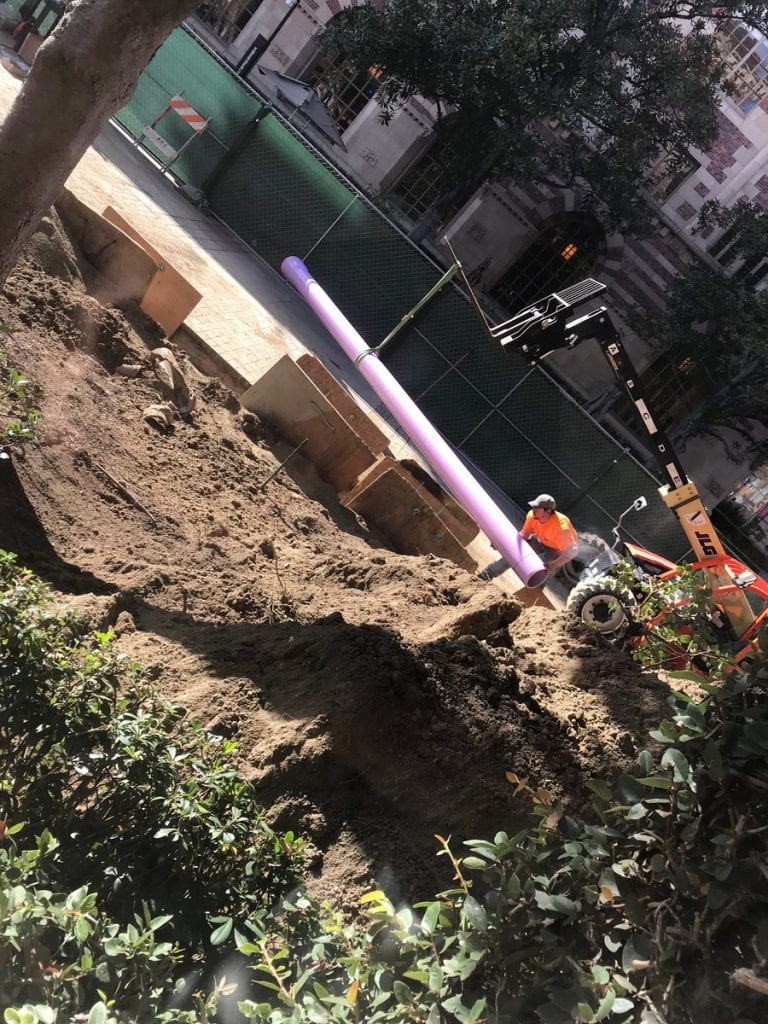
OCTOBER 2018 UPDATE
Water Conservation
USC has decreased its overall water usage in HCF (hundred cubic feet) by 8% from fiscal/academic year 2014 to 2017. We have reduced our water consumption usage in gal/sf (gallons per square foot) by 5% from FY14 to FY17. This reduction can be attributed to end user behavior changes, installation of low-flow water fixtures, and other on-going conservation efforts.
UPC-HSC_Water_Consumption_Data_July2013-June2018
We estimated that upgrading 8,000+ water fixtures across campus would reduce water usage 19% by 2020. Although USC Housing has replaced approx 6,800 old water fixtures, our water usage has not yet decreased to anticipated levels. Installation of the remaining 1,200 water fixtures in non-housing buildings will be completed by 2020.
The city’s recycled water project would have enabled USC to achieve our Sustainability 2020 25% reduction Goal; however, the project has been delayed until 2024. However, USC will complete the final two sections of the main line installation on UPC by January 2019 (see link below), and will begin piping to the cooling towers and field irrigation (schedule TBA).
Recycled_Water_Plan_Map-UPC_Oct2018
AUGUST 2018 UPDATE
Recent progress on achieving the 2020 Plan Goals include:
Education and Research
The new Center for Sustainability Solutions co-hosted its first event on August 23-24, Rethinking Water Management: A Data-Driven Future.
Energy Conservation
The LED lighting retrofit, HVAC automation, and building retro-commissioning projects are funded and FMS is hiring project managers and assembling implementation plans and schedules, which will be announced as they are finalized.
Transportation
USC Transportation is launching a comprehensive mobility hub platform this fall that will meet the university’s Sustainability 2020 goals and enable travelers to plan alternative transportation from any point-A-to-point-B in Los Angeles.
Engagement
In fall 2018, FMS, USC Housing, and USC Sustainability will launch Trojans Recycle Right, the first university-wide waste diversion engagement initiative to accompany the installation of hundreds of new recycling receptacles located in classroom buildings and in outdoor public spaces. The indoor bins are scheduled to be installed by the end of calendar year 2018. The outdoor recycling receptacles are scheduled to be installed by July 2019.
Water and energy engagement campaigns are planned for launch in spring 2019.
APRIL 2018 UPDATE
University senior leadership has approved three 2020 Plan energy conservation projects for funding. When completed by 2020, these will exceed the 2020 Plan goal of a 20% reduction of Greenhouse Gas emissions below 2014 levels. The three new projects are:
- indoor/outdoor LED lighting retrofit
- HVAC automation initiative
- comprehensive energy efficiency recommissioning in select buildings
In the 2014-2017 USC Greenhouse Gas Emissions Inventory Summary, prepared by Unlimited Carbon Assistance Network in February 2018, USC rated:
- #2 of eight peer universities for emissions per 1,000 gross square foot (GSF) resulting from burning fuels or using chemicals (natural gas, boiler, refrigerants, etc.) and #1 of seven peer universities for emissions resulting from generating electricity
- #2 of eight peer universities for net emissions per student FTE resulting from burning fuels or using chemicals, and #5 of seven peer universities for emissions resulted from generating electricity
APRIL 2017 UPDATE
University senior leadership has approved five 2020 Plan projects for funding. These include:
- three water conservation projects that, when completed by 2020, will meet or exceed the water conservation goals.
- a comprehensive waste diversion plan that will meet the 2020 Plan waste diversion goal.
- resources for USC Purchasing that will lay the groundwork for a comprehensive sustainable procurement program by 2020.
Water Conservation
Three approved water conservation proposals include:
- a water fixture upgrade project that will install approx. 8,000 water fixtures, estimated to be complete by end 2019
- a water metering project that will bring 19 sub-meters to the UPC campus, providing a better profile of building types. The project will be implemented on the following schedule:
- Phase 1: April 2019 = Approximately ten sub-meters
- Phase 2: July 2019 = Approximately nine sub-meters
- a recycled water project. Los Angeles Department of Water and Power has delayed its targeted start of construction of the Downtown Water Recycling Project (WRP) which will provide a source of recycled water for the University campus via approximately 10 miles of new pipe that will connect to the University Park Campus at Exposition and Watt Way. Construction is scheduled to begin in 2021 and estimated to be completed in 2024. Therefore, the USC Sustainability 2020 Plan project for installation of recycled water pipe to connect to the city infrastructure will be delayed until the LADWP project is completed. For more information on the recycled water infrastructure proposal, click here.
Waste Diversion
Funding has been approved for the 2020 Plan waste diversion project, which will be implemented as following:
- Phase 1 (75 bins): USC Village to 34th St., west of Trousdale to Jefferson, Vermont on the east and Downey on the south – COMPLETE
- Phase 2 (95 bins): Beginning December 20, 2017 = Inside Exposition, Trousdale, Downey, Vermont – COMPLETE
- Phase 3 (105 bins): Beginning September 1, 2018 = East of Trousdale to Figueroa, Jefferson and Exposition.
- Phase 4 (100 bins): Beginning December 30, 2018 = Center campus between 34th, Downey, Trousdale and McClintock
Procurement
USC Business Services engaged a fixed-term Senior Procurement Specialist to assist with drafting a procurement sustainability policy, integration strategy, and benchmark sustainable surplus sales programs. The specialist’s assessment was completed in the fall of 2017 and the program’s implementation phase is now being created. Sustainable purchasing programs will be implemented for paper, cleaning supplies, and janitorial paper in the first quarter of 2018. Programs for ink/toner, office supplies, electronics, and medical research supplies will be implemented later in 2018, TBD.
USC Hospitality is currently trending at 33.7% sustainable food procurement. The 2020 Plan goal is 20%.